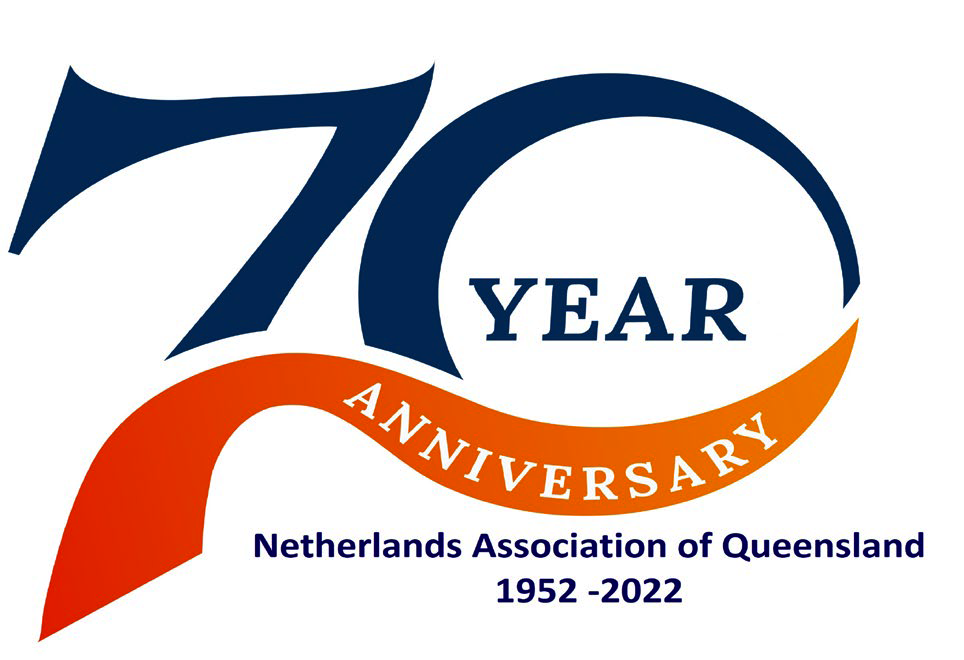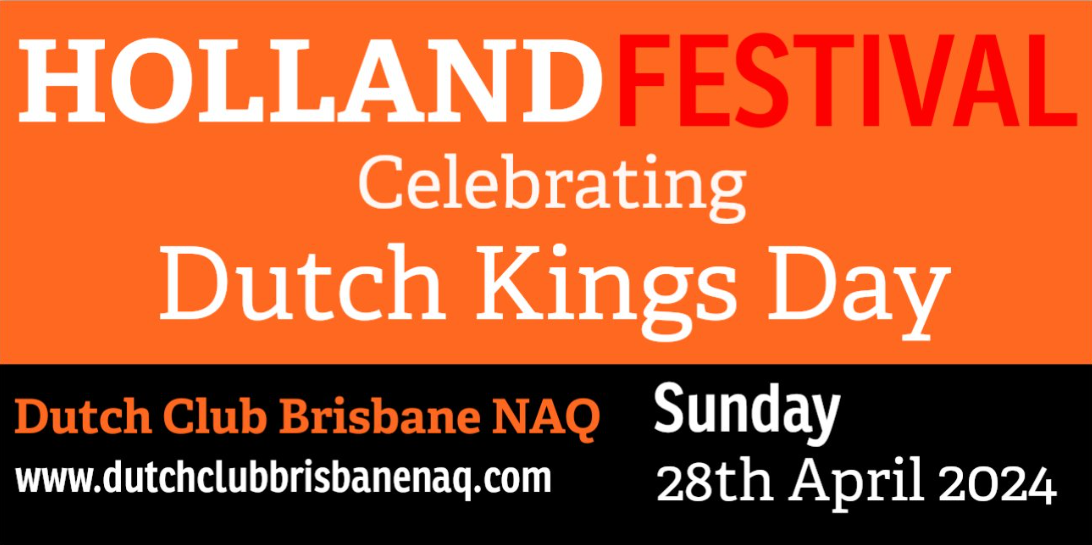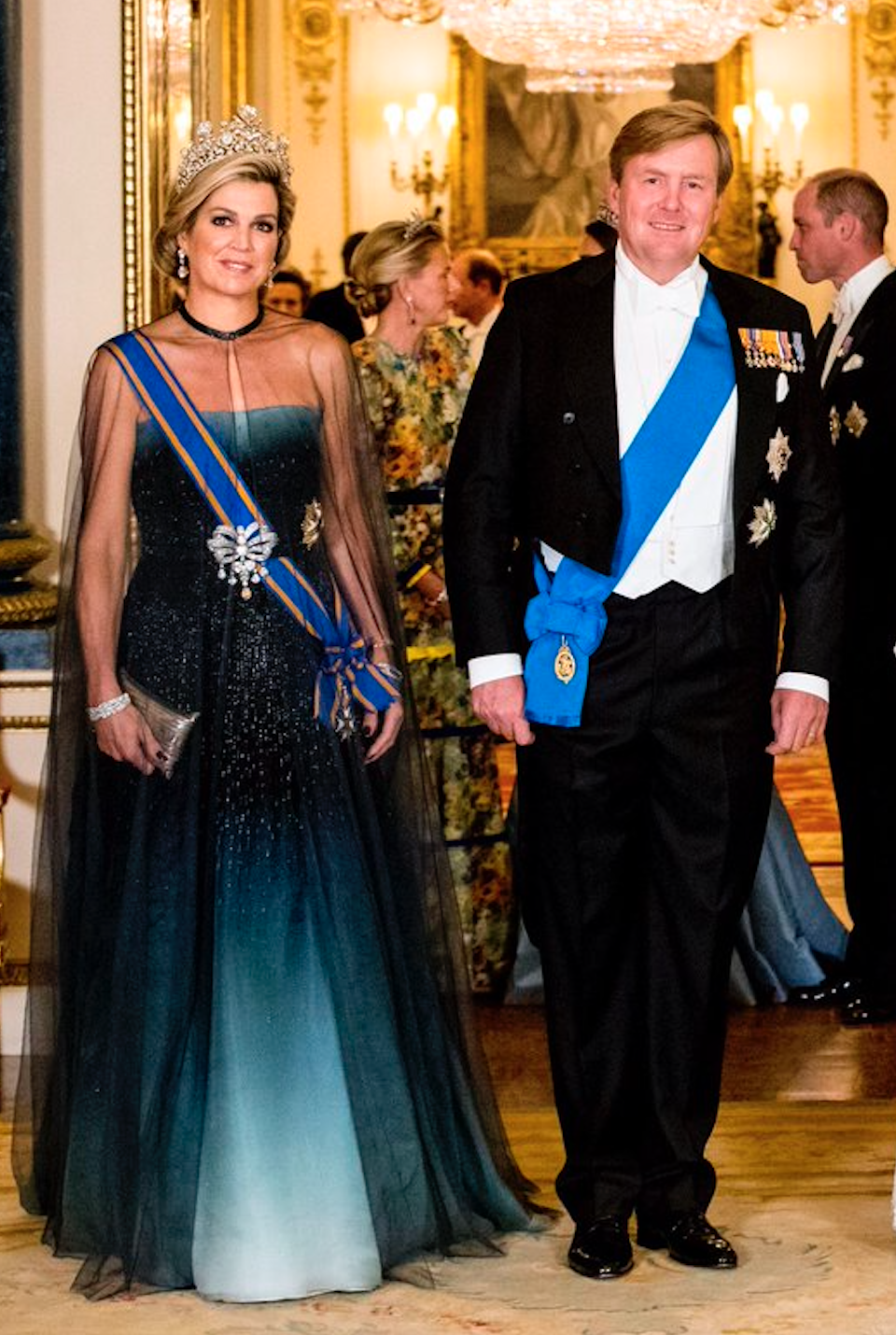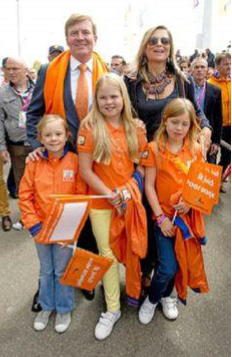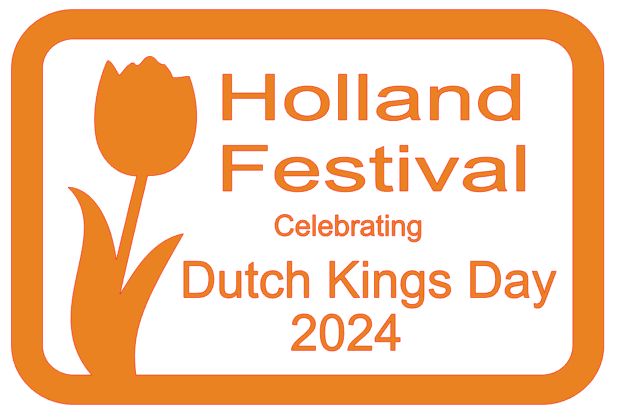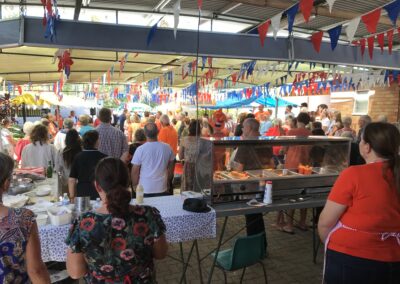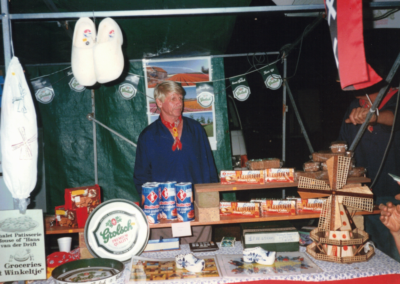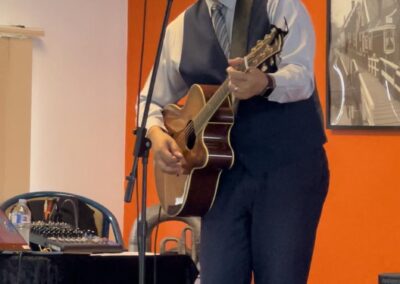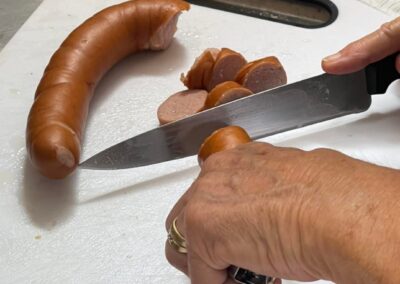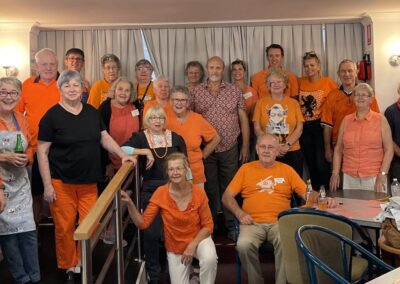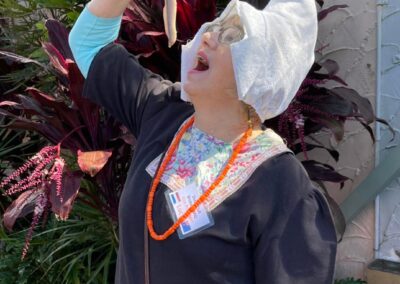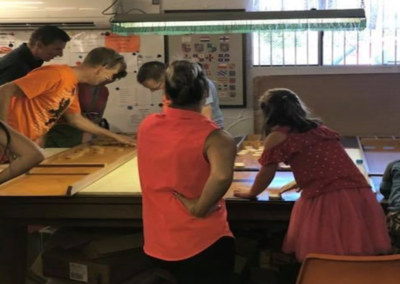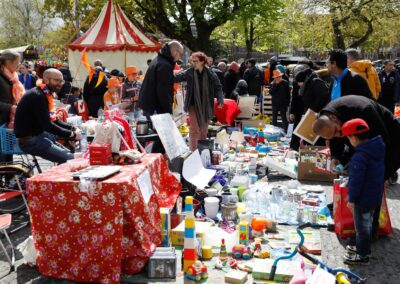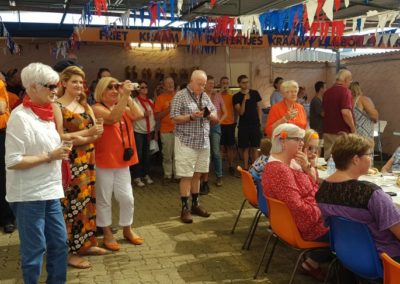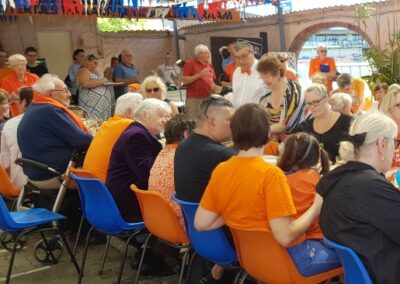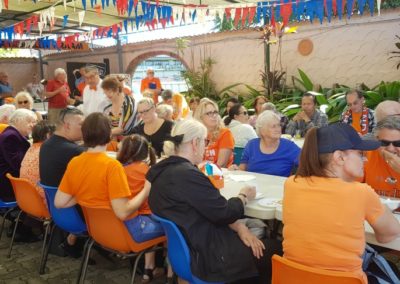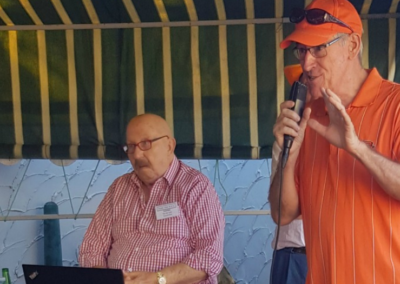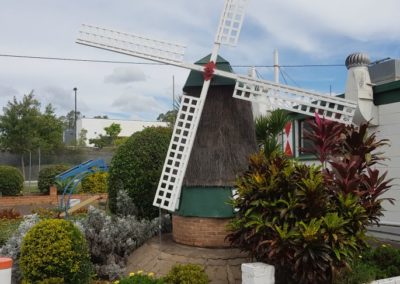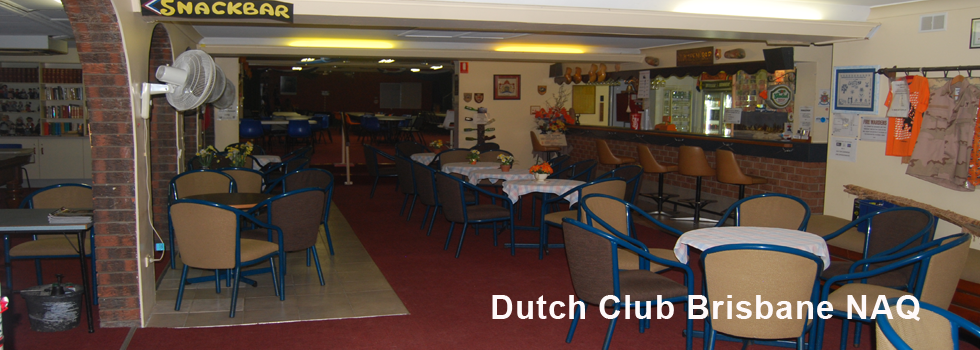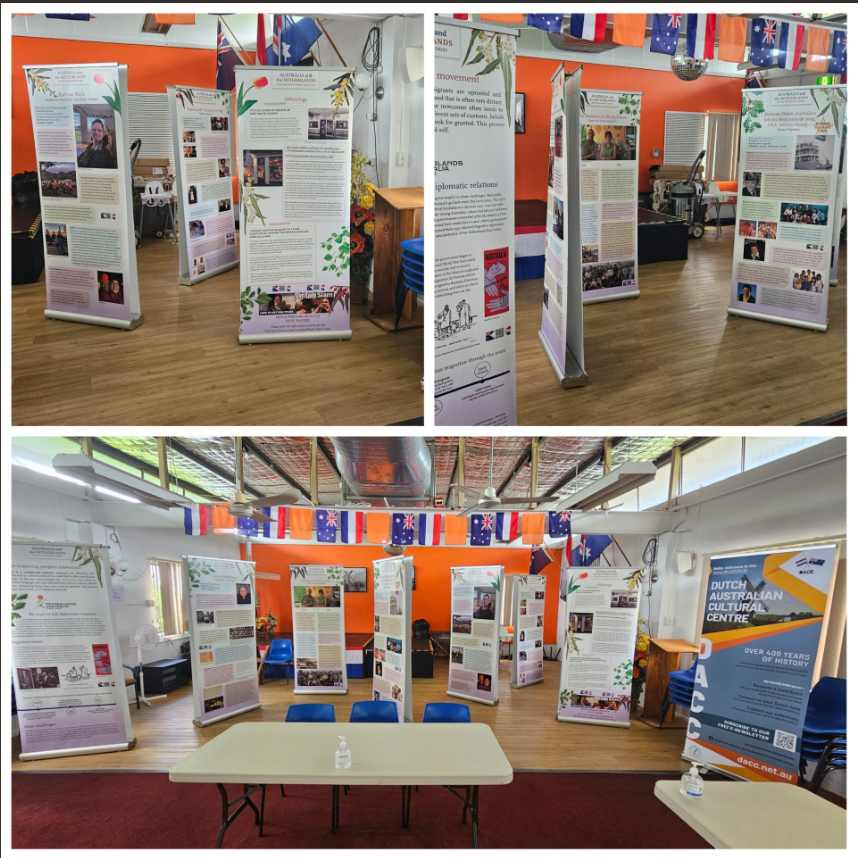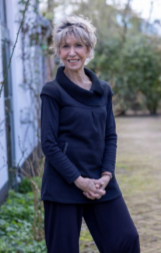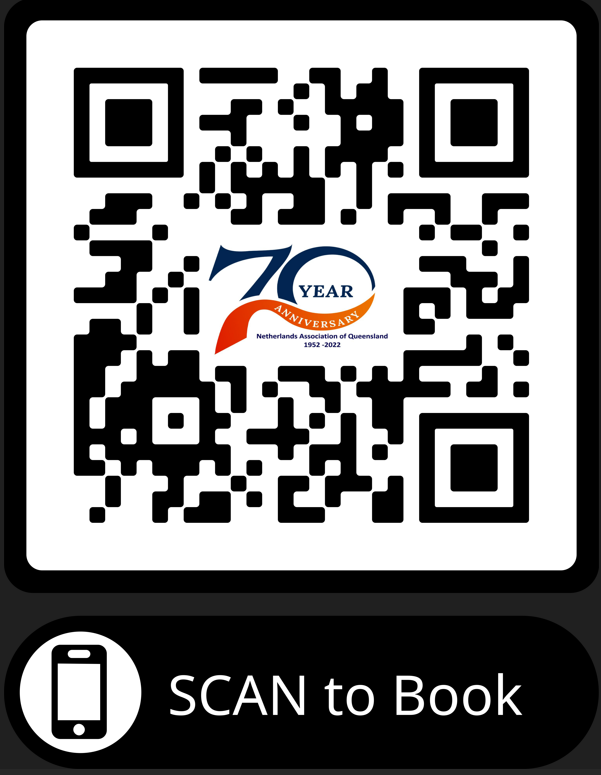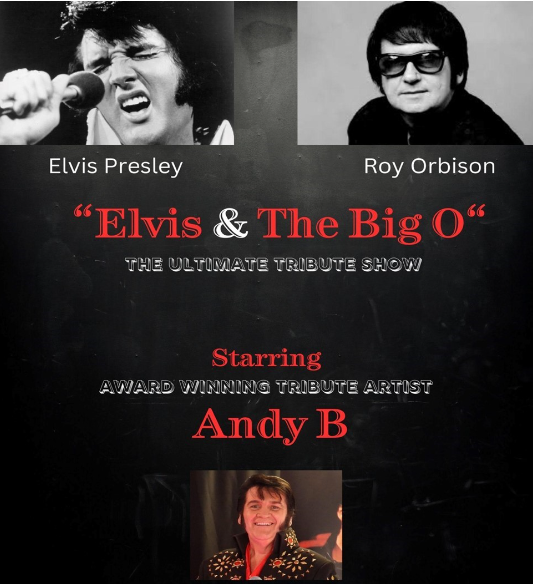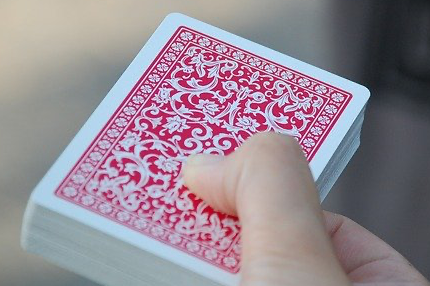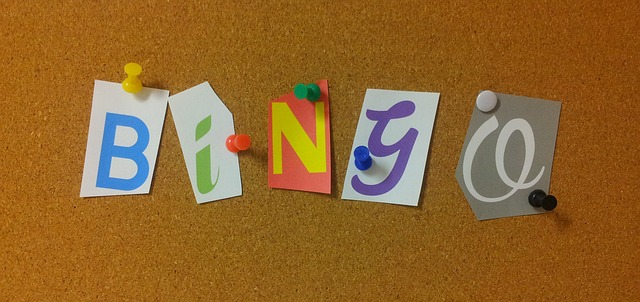The game of Klaverjassen is one of the most popular card games in the Netherlands, traditionally played in cafes and social clubs, as well as at home. It consists of 4 players who play in pairs, sitting opposite each other. Klaverjas has a number of variants, named after the cities where the varient originated: Amsterdam, Rotterdam and Utrecht. This description is of the Amsterdam version, with some notes describing the variations. Another variation of Klaverjas is known as Kraken is described below.
The Object of the Game
The object of the game is to score as many points as possible in 16 hands. In competition games the players on one table will rotate so as to have had each of the other three as a partner, so playing 3 sets of 16 hands.
In each hand the object of the game is for the player (and partner) who chooses trumps to collect more than half of the available points. If they fail to do this then they score nothing at all and the opposing pair receives all of the points.
Points are collected by taking tricks containing valuable cards, and also as bonus points during the play.
Deal and play are clockwise and the turn to deal passes to the left for the previous dealer after each hand.
The Deal
The cards are shuffled and dealt, not as single cards, but in 3 groups, first three cards to each player, then two cards, then three cards. Sometimes the cards are dealt in two groups of four cards. The player to the left of the dealer chooses trumps.
The Pack
A 32 card pack is used, consisting of the cards A, K, Q, J, 10, 9, 8, 7 in each of the usual four suits – spades, clubs, hearts and diamonds. Note that on Dutch cards the corner indices are usually A (Aas) for the ace, H (Heer) for the king, V (Vrouw) for the queen and B (Boer) for the jack.
The Ranking and Values of the Cards
In each hand one suit will be trumps. The ranking of the cards and their values are different in the suit chosen as trumps from the other suits. The ranking, from high to low, and the card values are as follows:
| |
High |
>> |
>> |
>> |
>> |
>> |
>> |
Low |
| Trump suit rank: |
Jack |
9 |
Ace |
10 |
King |
Queen |
8 |
7 |
| Card value: |
20 |
14 |
11 |
10 |
4 |
3 |
0 |
0 |
| Other suits rank: |
Ace |
10 |
King |
Queen |
Jack |
9 |
8 |
7 |
| Card value: |
11 |
10 |
4 |
3 |
2 |
0 |
0 |
0 |
This gives 152 card points in the pack in total. There are 10 extra points for the last trick, bringing the total to 162, in addition to which bonus points may be scored.
Choosing Trumps
There are a several ways of deciding trumps. The players agree prior to starting which rules will be used:
- Free choice.
- The player to dealer’s left, after looking at their hand, can choose any suit as trumps or pass. If he passes, the next player has the same options, and so on clockwise around the table. If all four players pass, the player to dealer’s left must choose trumps.
- Variation. in some variations the dealer has first chance to play, followed by the other players in clockwise order. If all pass the dealer must play.
- Utrecht (compulsory play)
- The player to the left of the dealer must play. He chooses a trump suit after seeing his hand.
- Random trump.
-
A second pack of cards is shuffled and the top card turned over to determine trumps. The player to the left of the dealer has the choice of playing with the given trump or passing. If he passes then the player to his left is given the same choice. If all four players pass then another trump is chosen according to one of the following methods (to be agreed in advance):
- Another card from the second pack is turned over; the player to the left of the dealer must play using this trump.
- The player to the left of the dealer elects trump. This must not be the same suit as has already been passed by everyone.
The Play
No matter who chose trumps, the player to the left of the dealer leads to the first trick. The other three players must follow suit if possible. If no trumps are played, the highest card of the suit led, according to the ranking order listed above, takes the trick. If the trick contains trumps, the highest trump wins. The player taking the trick leads the next trick and so on.
There are two versions of the rules governing the playing of trumps:
- Amsterdam Rules
- 1. If you cannot follow suit and the card which is winning the trick so far has been played by the opposing team then you must beat this card with a trump if you can. If they are winning with a trump, you must play a higher trump if you can. If you have no higher trump you must throw away a card of another (non-trump) suit. You are not allowed to under-trump (play a lower trump) unless your hand consists entirely of lower trumps;
- 2. If you cannot follow suit and the card which is winning the trick so far is your partner’s, then you may play any card of any suit, except that if your partner’s winning card is a trump, you are not allowed to under-trump unless your hand consists entirely of lower trumps;
- 3. If trumps are led then subsequent players must beat the highest trump so far played to the trick if they can, even if this highest trump was played by their partner. If they cannot beat the highest trump so far played, they must play a lower trump. If they have no trumps at all, they can play any card.
- Rotterdam Rules
- 1. If you cannot follow suit, you must always play a trump if you can;
- 2. When playing a trump, you must beat any trumps already played to the trick if you can (this applies when trumps are led, and also when a non-trump card was led which another player has already trumped);
- 3. If you have no card of the suit led and no trumps you may play any card.
Bonus Points
The bonus points for taking a combination of cards in a trick are called roem. The commonest type of roem is a run, or unbroken sequence of cards in a suit. For sequences, the order of cards in each suit is ace, king, queen, jack, ten, nine, eight, seven. Note that this applies equally to trumps and to other suits, and is different from the ranking order of the cards for trick taking purposes. The possible roem are as follows:
- Run of three cards of the same suit – 20 bonus points
- Run of four cards of the same suit – 50 bonus points
- Run of three cards of the same suit, including the king and queen of trumps – 40 bonus points
- Run of four cards of the same suit, including the king and queen of trumps – 70 bonus points
- Four kings, queens aces or tens – 100 bonus points
- Four jacks – 200 bonus points
- King and queen of trumps (stuk) – 20 bonus points
There is also a bonus of 10 points for the team who took the last trick and an additional 100 bonus points if one team takes all the tricks.
Bonus points are noted on the score sheet as follows:
| I |
20 points |
| II |
40 points |
V
|
50 points |
| VI |
70 points |
O
|
100 points |
OO
|
200 points |
Players will use their skill to collect bonus points in the tricks that they or their partners take, and avoid giving bonus points to the opposing pair.
When bonus points are made they must be claimed by the pair who win the trick in order for them to be counted.
It is sometimes correct deliberately not to claim bonus points; this happens if your team chose trumps, but you expect to lose the hand (in which case the bonus would go to the opposing team).
Scoring
At the end of each hand the points in the tricks of both teams are counted. Each team then adds the bonus points collected. If the team of the player who made trumps has more points than their opponents, then each team is credited with the points they obtained. If the team of the player who made trumps fail to take more points than their opponents, then the team which made trumps score no points at all, and all the points for the hand, including bonus points collected by both sides, are credited to the opposing team.
If no extra bonus points are obtained then the points in one hand add up to 162 (152 for the cards and 10 for the last trick). The team which chooses trumps must therefore obtain at least 82 points in order to score.
Signalling
Signalling to your partner is an accepted part of the game, and is necessary to skillful play. The most important signals are discards to indicate to partner which is your own strong suit, and leads to indicate the strength of your trumps. There are many ways of doing this, the most common being:
- Same suit signals.
- Here you discard a low card (7, 8 or 9) of a particular suit to indicate that you have the ace (the highest card) of the same suit. Discarding a picture card of a suit warns your partner not to lead that suit.
- Opposite suit signals.
- Here you play any card of a red or black suit to indicate that you are strong in the other suit of the same colour. For example, playing the queen of hearts indicates to your partner that you have a strong diamonds. This method of signalling allows you to preserve a long suit and discard unwanted single cards.
- Lead signal.
- The player who chooses trumps and leads the first card can indicate that he has a weak trump hand. If he has the jack of trumps (the highest trump) but little else, he leads a low card of another suit. If he does not have the jack, then he should lead the ace of another suit. His partner then knows if it is safe to lead trumps or not.
The signalling systems to be used between partners should be discussed (and announced to the opponents) before commencing play, to avoid confusion.
Three Player Variation
If there are only three players then each player receives 10 cards, in batches of 4, 3 and 3. After the first batch of 3 cards to each player, two cards are placed face down in the middle of the table.
The player to the left of the dealer can elect to play with a trump suit of his choice or pass. If he passes then the player to his left can play or pass. If he passes too then the dealer can play or pass. If all 3 players pass then the dealer shuffles and deals again. Once a player has elected to play he adds the two spare cards to his hand without showing them, and then discards two cards face down to one side. Normal play now takes place, except that there are 10 tricks. The player who takes the last trick also takes the two spare cards.
Each player plays for his own points, but tries also to prevent the player who made trumps from obtaining more than half the points. If the trump maker succeeds in taking more than half the points, each of the three players scores the points he has taken. If the trump maker takes half the points or less, he scores nothing, and both of his opponents score the total points in the hand, including any bonus points.
Other Variations
Rather than playing 16 deals, some play up to an agreed target score, for example 1500.
Kraken
This version is also known as Wilde Boom (wild tree). After the trump maker has chosen trumps, each of his opponents in turn (first the player to the left of the trump maker and then the player to the right) has the opportunity to challenge this, saying “ik kraak” or “contra”. An opponent will challenge if they think that the player choosing trumps will not get more than half the points. This challenge automatically doubles the final scores. If there is a challenge, the trump maker or his partner can challenge back (herkraken or rekraken or ré), again doubling the points (so they are multiplied by 4 altogether). The opponents can then challenge again (superkraken) so that the points are multiplied by eight.
As well as scoring for card combinations (roem) in tricks, the players can also claim before playing to the first trick for any scoring combinations they have in their hands. As in normal Klaverjas four jacks are worth 200, four aces, kings, queens or tens are worth 100, a run of three is worth 20, and a run of four is worth 50. In addition, a run of five or more cards of a suit in hand scores 100 points. The team with the highest scoring single combination scores all its combinations and the other team scores nothing for theirs. Between two equal valued combinations the one containing the highest card wins. A player who holds the king and queen of trumps (stuk) can always score for them irrespective of which team has the best instance of roem in hand. Stuk is not claimed at the start: the 20 points for stuk can be claimed during the play when playing either card, irrespective of which team had the highest combination.
The play follows the rules of normal Klaverjassen. If there has been one or more kraak, the side which announced the last kraak needs more points than their opponents to win, and whichever team wins scores all the points in the game, the other team scoring nothing. These points are doubled, redoubled etc according to the kraaks before the beginning of play.
If spades are trumps then an extra double is automatically applied to the final scores.
16 deals are played (each player deals four times) and object is to avoid getting crosses. In this version:
- The first player, to the left of the dealer, must choose trumps (Utrecht rules).
- The play of the cards is according to Amsterdam rules.
- If one side wins all the tricks (pit) they score an extra 100 roem.
- Kraak, rekraak, etc. and the double when spades are trumps only affect the 162 points for cards and the last trick, not the points for roem.
- If the trump making team (without kraak) or the team that announced the final kraak fails to get more than half the points, then their opponents score the whole 162 for cards and last trick, but each side scores its own roem.
- When scoring the hand, each team’s card point score is divided by 10 and rounded to the nearest whole number (it is not clear, but 0.5 is probably rounded down) before applying any doubles.
- Each team must say kraak to the opponents’ trump choice at least four times during the 16 deals.
- Crosses are scored as follows.
- The team with the lower total point score after 16 hands gets 4 crosses.
- If a team wins all the tricks (pit) in any deal their opponents get 1 cross, or 2 if spades are trumps.
- If there is a kraak the losing team gets 2 crosses for a simple kraak, or 4 crosses for a rekraak, or 8 crosses for a superkraak: if spades are trumps the number of crosses is doubled: 4 for kraak, 8 for rekraak, 16 for superkraak.
- At the end of the 16 deals the crosses scored by the two teams are compared and the team with more crosses has to pay according to the difference, an agreed amount per cross.
Dutch Terminology
Nel – the nine of trumps
Roem – bonus points for sets and sequences
Stuk – the king and queen of trumps
Nat or beet – not getting more that half of the points
Pit or mars – when one team wins all the tricks
Boom (tree) – the set of 16 deals which make up a game (or however many deals it takes before the winning team reaches 1500, if you play that way)
Kleur seinen – same suit signalling
Tegenkleur seinen – opposite suit signalling

